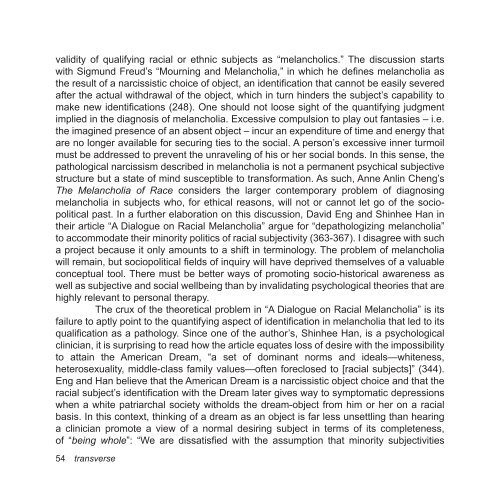Untitled - Centre for Comparative Literature - University of Toronto
Untitled - Centre for Comparative Literature - University of Toronto
Untitled - Centre for Comparative Literature - University of Toronto
You also want an ePaper? Increase the reach of your titles
YUMPU automatically turns print PDFs into web optimized ePapers that Google loves.
validity <strong>of</strong> qualifying racial or ethnic subjects as “melancholics.” The discussion starts<br />
with Sigmund Freud’s “Mourning and Melancholia,” in which he defi nes melancholia as<br />
the result <strong>of</strong> a narcissistic choice <strong>of</strong> object, an identifi cation that cannot be easily severed<br />
after the actual withdrawal <strong>of</strong> the object, which in turn hinders the subject’s capability to<br />
make new identifi cations (248). One should not loose sight <strong>of</strong> the quantifying judgment<br />
implied in the diagnosis <strong>of</strong> melancholia. Excessive compulsion to play out fantasies – i.e.<br />
the imagined presence <strong>of</strong> an absent object – incur an expenditure <strong>of</strong> time and energy that<br />
are no longer available <strong>for</strong> securing ties to the social. A person’s excessive inner turmoil<br />
must be addressed to prevent the unraveling <strong>of</strong> his or her social bonds. In this sense, the<br />
pathological narcissism described in melancholia is not a permanent psychical subjective<br />
structure but a state <strong>of</strong> mind susceptible to trans<strong>for</strong>mation. As such, Anne Anlin Cheng’s<br />
The Melancholia <strong>of</strong> Race considers the larger contemporary problem <strong>of</strong> diagnosing<br />
melancholia in subjects who, <strong>for</strong> ethical reasons, will not or cannot let go <strong>of</strong> the sociopolitical<br />
past. In a further elaboration on this discussion, David Eng and Shinhee Han in<br />
their article “A Dialogue on Racial Melancholia” argue <strong>for</strong> “depathologizing melancholia”<br />
to accommodate their minority politics <strong>of</strong> racial subjectivity (363-367). I disagree with such<br />
a project because it only amounts to a shift in terminology. The problem <strong>of</strong> melancholia<br />
will remain, but sociopolitical fi elds <strong>of</strong> inquiry will have deprived themselves <strong>of</strong> a valuable<br />
conceptual tool. There must be better ways <strong>of</strong> promoting socio-historical awareness as<br />
well as subjective and social wellbeing than by invalidating psychological theories that are<br />
highly relevant to personal therapy.<br />
The crux <strong>of</strong> the theoretical problem in “A Dialogue on Racial Melancholia” is its<br />
failure to aptly point to the quantifying aspect <strong>of</strong> identifi cation in melancholia that led to its<br />
qualifi cation as a pathology. Since one <strong>of</strong> the author’s, Shinhee Han, is a psychological<br />
clinician, it is surprising to read how the article equates loss <strong>of</strong> desire with the impossibility<br />
to attain the American Dream, “a set <strong>of</strong> dominant norms and ideals—whiteness,<br />
heterosexuality, middle-class family values—<strong>of</strong>ten <strong>for</strong>eclosed to [racial subjects]” (344).<br />
Eng and Han believe that the American Dream is a narcissistic object choice and that the<br />
racial subject’s identifi cation with the Dream later gives way to symptomatic depressions<br />
when a white patriarchal society witholds the dream-object from him or her on a racial<br />
basis. In this context, thinking <strong>of</strong> a dream as an object is far less unsettling than hearing<br />
a clinician promote a view <strong>of</strong> a normal desiring subject in terms <strong>of</strong> its completeness,<br />
<strong>of</strong> “being whole”: “We are dissatisfi ed with the assumption that minority subjectivities<br />
54 transverse




